精选中考阅读理解100篇(附答案)21-35
初中现代文阅读小说100篇训练(带答案、解析)
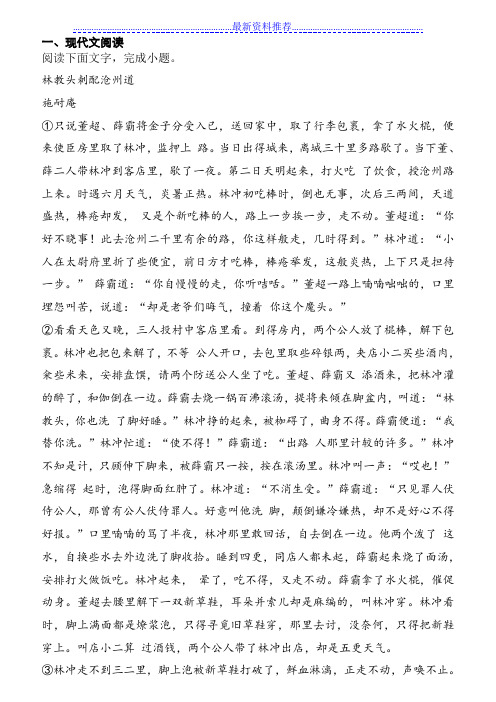
……………………………………………………………最新资料推荐…………………………………………………一、现代文阅读阅读下面文字,完成小题。
林教头刺配沧州道施耐庵①只说董超、薛霸将金子分受入已,送回家中,取了行李包裹,拿了水火棍,便来使臣房里取了林冲,监押上路。
当日出得城来,离城三十里多路歇了。
当下董、薛二人带林冲到客店里,歇了一夜。
第二日天明起来,打火吃了饮食,授沧州路上来。
时遇六月天气,炎暑正热。
林冲初吃棒时,倒也无事,次后三两间,天道盛热,棒疮却发,又是个新吃棒的人,路上一步挨一步,走不动。
董超道:“你好不晓事!此去沧州二千里有余的路,你这样般走,几时得到。
”林冲道:“小人在太尉府里折了些便宜,前日方才吃棒,棒疮举发,这般炎热,上下只是担待一步。
” 薛霸道:“你自慢慢的走,你听咭咶。
”董超一路上喃喃咄咄的,口里埋怨叫苦,说道:“却是老爷们晦气,撞着你这个魔头。
”②看看天色又晚,三人投村中客店里看。
到得房内,两个公人放了棍棒,解下包裹。
林冲也把包来解了,不等公人开口,去包里取些碎银两,夹店小二买些酒肉,籴些米来,安排盘馔,请两个防送公人坐了吃。
董超、薛霸又添酒来,把林冲灌的醉了,和伽倒在一边。
薛霸去烧一锅百沸滚汤,提将来倾在脚盆内,叫道:“林教头,你也洗了脚好睡。
”林冲挣的起来,被枷碍了,曲身不得。
薛霸便道:“我替你洗。
”林冲忙道:“使不得!”薛霸道:“出路人那里计较的许多。
”林冲不知是计,只顾伸下脚来,被薛霸只一按,按在滚汤里。
林冲叫一声:“哎也!”急缩得起时,泡得脚面红肿了。
林冲道:“不消生受。
”薛霸道:“只见罪人伏侍公人,那曾有公人伏侍罪人。
好意叫他洗脚,颠倒嫌冷嫌热,却不是好心不得好报。
”口里喃喃的骂了半夜,林冲那里敢回话,自去倒在一边。
他两个泼了这水,自换些水去外边洗了脚收拾。
睡到四更,同店人都未起,薛霸起来烧了面汤,安排打火做饭吃。
林冲起来,晕了,吃不得,又走不动。
薛霸拿了水火棍,催促动身。
(完整版)100篇初中生阅读题(含答案),推荐文档
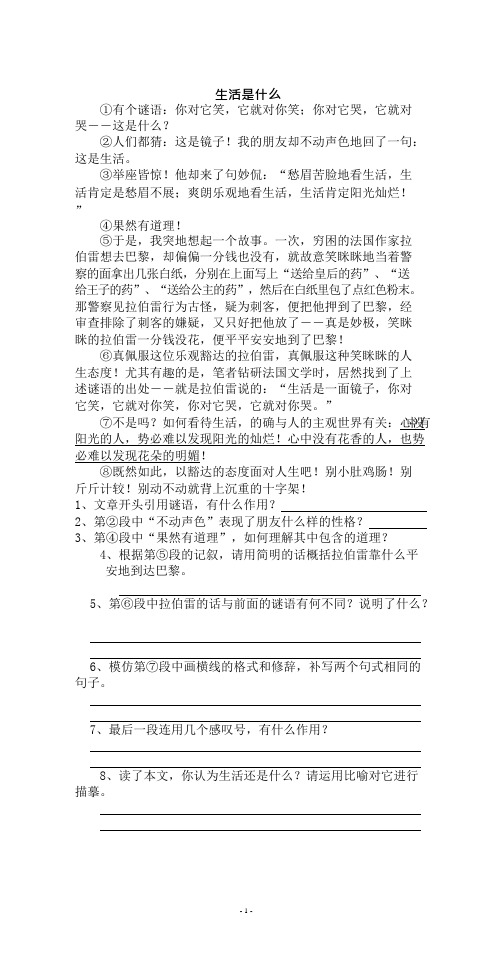
生活是什么①有个谜语:你对它笑,它就对你笑;你对它哭,它就对哭--这是什么?②人们都猜:这是镜子!我的朋友却不动声色地回了一句:这是生活。
③举座皆惊!他却来了句妙侃:“愁眉苦脸地看生活,生活肯定是愁眉不展;爽朗乐观地看生活,生活肯定阳光灿烂!”④果然有道理!⑤于是,我突地想起一个故事。
一次,穷困的法国作家拉伯雷想去巴黎,却偏偏一分钱也没有,就故意笑眯眯地当着警察的面拿出几张白纸,分别在上面写上“送给皇后的药”、“送给王子的药”、“送给公主的药”,然后在白纸里包了点红色粉末。
那警察见拉伯雷行为古怪,疑为刺客,便把他押到了巴黎,经审查排除了刺客的嫌疑,又只好把他放了--真是妙极,笑眯眯的拉伯雷一分钱没花,便平平安安地到了巴黎!⑥真佩服这位乐观豁达的拉伯雷,真佩服这种笑眯眯的人生态度!尤其有趣的是,笔者钻研法国文学时,居然找到了上述谜语的出处--就是拉伯雷说的:“生活是一面镜子,你对它笑,它就对你笑,你对它哭,它就对你哭。
”⑦不是吗?如何看待生活,的确与人的主观世界有关:心中没有阳光的人,势必难以发现阳光的灿烂!心中没有花香的人,也势必难以发现花朵的明媚!⑧既然如此,以豁达的态度面对人生吧!别小肚鸡肠!别斤斤计较!别动不动就背上沉重的十字架!1、文章开头引用谜语,有什么作用?2、第②段中“不动声色”表现了朋友什么样的性格?3、第④段中“果然有道理”,如何理解其中包含的道理?4、根据第⑤段的记叙,请用简明的话概括拉伯雷靠什么平安地到达巴黎。
5、第⑥段中拉伯雷的话与前面的谜语有何不同?说明了什么?6、模仿第⑦段中画横线的格式和修辞,补写两个句式相同的句子。
7、最后一段连用几个感叹号,有什么作用?8、读了本文,你认为生活还是什么?请运用比喻对它进行描摹。
地平线小的时候,我才从秦岭来到渭北大平原,最喜欢骑上自行车在路上无拘无束地奔驰。
庄稼收割了,又没有多少行人,空旷的原野上稀落着一些树丛和矮矮的屋。
差不多一抬头,就看见远远的地方,天和地已经不再平行。
100篇初中生阅读题(含答案)
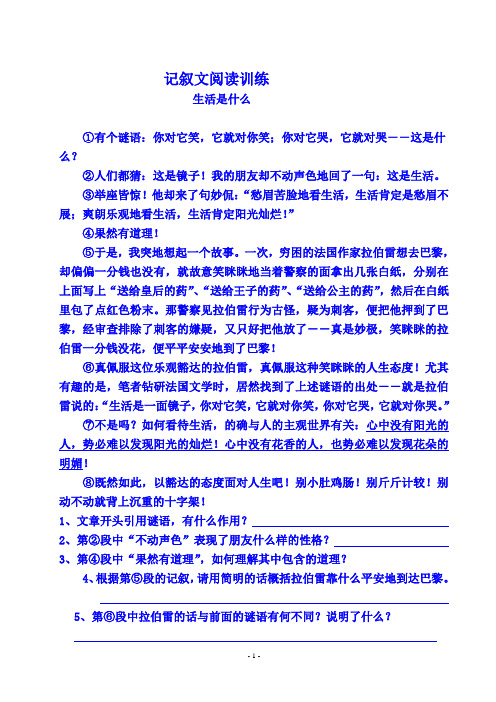
记叙文阅读训练生活是什么①有个谜语:你对它笑,它就对你笑;你对它哭,它就对哭--这是什么?②人们都猜:这是镜子!我的朋友却不动声色地回了一句:这是生活。
③举座皆惊!他却来了句妙侃:“愁眉苦脸地看生活,生活肯定是愁眉不展;爽朗乐观地看生活,生活肯定阳光灿烂!”④果然有道理!⑤于是,我突地想起一个故事。
一次,穷困的法国作家拉伯雷想去巴黎,却偏偏一分钱也没有,就故意笑眯眯地当着警察的面拿出几张白纸,分别在上面写上“送给皇后的药”、“送给王子的药”、“送给公主的药”,然后在白纸里包了点红色粉末。
那警察见拉伯雷行为古怪,疑为刺客,便把他押到了巴黎,经审查排除了刺客的嫌疑,又只好把他放了--真是妙极,笑眯眯的拉伯雷一分钱没花,便平平安安地到了巴黎!⑥真佩服这位乐观豁达的拉伯雷,真佩服这种笑眯眯的人生态度!尤其有趣的是,笔者钻研法国文学时,居然找到了上述谜语的出处--就是拉伯雷说的:“生活是一面镜子,你对它笑,它就对你笑,你对它哭,它就对你哭。
”⑦不是吗?如何看待生活,的确与人的主观世界有关:心中没有阳光的人,势必难以发现阳光的灿烂!心中没有花香的人,也势必难以发现花朵的明媚!⑧既然如此,以豁达的态度面对人生吧!别小肚鸡肠!别斤斤计较!别动不动就背上沉重的十字架!1、文章开头引用谜语,有什么作用?2、第②段中“不动声色”表现了朋友什么样的性格?3、第④段中“果然有道理”,如何理解其中包含的道理?4、根据第⑤段的记叙,请用简明的话概括拉伯雷靠什么平安地到达巴黎。
5、第⑥段中拉伯雷的话与前面的谜语有何不同?说明了什么?6、模仿第⑦段中画横线的格式和修辞,补写两个句式相同的句子。
7、最后一段连用几个感叹号,有什么作用?8、读了本文,你认为生活还是什么?请运用比喻对它进行描摹。
地平线小的时候,我才从秦岭来到渭北大平原,最喜欢骑上自行车在路上无拘无束地奔驰。
庄稼收割了,又没有多少行人,空旷的原野上稀落着一些树丛和矮矮的屋。
100篇初中生阅读题答案

[记叙文部分]生活是什么1、生动有趣,设置悬念,引人入胜,还有助于快速入题。
2、乐观豁达3、生活与人的主观世界有关。
悲观地看,生活悲观;乐观地看,生活灿烂。
生活与人的心态是一致的。
4、乐观豁达或聪明和智慧。
5、不同在于多了个比喻,说明了生活与镜子一样可以反映人的喜怒哀乐。
6、例如:(1)心中没有星星的人,势必难以发现星光的闪烁!(2)心中没有花鸟的人,也势必难以发现鸟语的婉转。
7、连用感叹句,增强了语言的气势和号召力,激发人们乐观地投入生活,豁达地面对人生。
它如号角,如战鼓,敲打涤荡着人的灵魂。
8、略地平线1、(1)天地相接一条线(2)很亮的灰白色(3)矮屋、树丛。
2、地平线看得到,永远走不到,又永远不断出现在前方。
3、这句话是把命运理想和天地相类比,天和地的平行与相接,就像人生中的命运和理想,时而一致,时而不一致,人生即是这种一致与不一致的统一。
4、追求地平线即追求人生理想。
它总在前方,指引人们不断追求;它又是永无止境的,鼓舞人们永远向前。
5、人生对理想的追求,应是永无止境的,理想激励人们不断求索,不断奋进。
6、略申奥形象大使澜述发言1、安导演的《卧虎藏龙》获奥斯卡金像奖一向受世人瞩目,因此该影片也为出席代表所熟知。
提到该影片容易使出席代表产生好感,引起共鸣,产生强烈的要了解中国的欲望,一开始便抓住了代表的心。
2、除了紫禁城、天坛和万里长城这几个标志性的建筑,北京拥有无数的戏院、博物馆,各种各样的餐厅和歌舞场所。
3、这是为了突出举办城市的人民的热情、友好、真诚。
4、举办音乐会。
共举办4年(2005-2008)。
由全世界青少年和表演家参加。
在北京奥运村和北京市展开。
5、古丝绸之路是中国走向世界之路。
表达了中国人民走向世界,共享和平--共享奥运的最大心愿。
6、最久(接通历史)、最高、最广、目睹者最多。
7、借马可·波罗的话告诉各位代表,我们所述的不仅是真的,而且仅说了一部分。
要真正了解中国,只有亲自去看一看。
答案】初中语文阅读理解必备100篇(一)

答案】初中语文阅读理解必备100篇(一)一、我梳着仕女发型,顶着满头菊花跑出家,惹得村人围观。
我周日买回一盆黄色的菊花,勾起了我对孩提时的美好回忆和对美的追求,驱散了秋天的寒意,让心灵一片温暖。
我喜爱和赞美菊花的情感已不言而喻。
二、父亲希望我长大有出息,能够跳出穷山村,展翅飞翔。
但因为名字的缘故,我不能和小伙伴们一起玩儿,感到孤独。
在接到大学录取通知书的那天,我为自己终于可以脱离父亲的管制,实现不想见到他的梦想而哭。
对父亲大办酒席时的高兴劲儿,我不屑一顾。
在冲出家门的时候,我也不顾及父亲的黯然神伤。
前两年在省城念书,我没有回过一次家,没有认真给父亲写过一封信。
三、作者运用拟人、比喻的手法,生动形象地写出野菊花开放的姿态,表现它“随意又随性”,表达了作者对它的喜爱和赞美,同时表现了父亲对“我”就要离开家乡时恋恋不舍的心理活动,以及对“我”独立生活担心的心理活动。
四、一开始我对父亲的迷信举动嗤之以鼻,甚至愤然。
但当父亲竟然能够写出我的名字时,我的灵魂被深深地灼痛了,苏醒了。
我从父亲的这个举动中感受到了他沉重的爱,并开始忏悔自己。
最后,黄色的菊花勾起了我对美好回忆和对美的追求,让心灵一片温暖。
我对菊花的喜爱和赞美已不言而喻。
五、神山赶庙会时,我先是只顾脱模子,后在看摔跤时一直挎着一篮脱好的模子未放下。
东古城捕鸟时,我偶然发现上好的黄土后独自秘密挖黄土,如获至宝。
2.本段文字展现了祖母对“我”的偏爱,同时也表现了“我”对脱模子、捏泥塑等手工艺的热爱和珍视。
此外,本段与文章第一段相呼应,进一步加深了文章的主题,使文章的结构更加连贯自然。
注:本段分数标准为内容和结构各1分,祖母的偏爱和手工艺的表现分别为0.5分。
3.答案示例:这句话将泥土比作“花瓣”,生动地描绘了泥土片状微卷的形态。
同时,“快活”和“绽”这些词不仅赋予了泥土生命的活力,还表达了“我”得到这块好土时的喜悦之情。
注:赏析句子应从字词、修辞和主旨三个方面入手,语言通顺流畅即可。
100篇阅读及答案

1.(1)C(2)B (3)A2. 舒适壮丽好像拓展3. 黄果树瀑布虽不如庐山瀑布那样长,但远比它宽得多,所以显得气势非凡,雄伟壮观。
1. 我爱荷叶2. 看啊,这些荷叶墨绿、浑圆、厚重。
3. ,;,,,;,,……4.C1. 美丽发黑枯败圣洁细长2. 白瓷一般的光滑的羽毛,没有一丝杂质,就好像一团浓墨泼上去也会整个儿滚落下来,沾不上一星半点。
3. 任何一种飞禽都无法具有这种个性高傲纯洁娴静深沉1. 新鲜顽皮快活自由自在2. 清晨中午傍晚3. 只见她的头发里飞出一片片雪白雪白的柳絮,既像棉絮也像雪花。
4. 抄写:她那嫩绿嫩绿的头发上的无数个小水珠,在几缕阳光的照射下闪闪发光,犹如一颗颗珍珠。
仿写:村子里一棵棵器油油的广柑树,就像一把把巨大的伞,挺立在那里,满树都闪着细碎的银光。
1.不同景象:从第一扇窗小孩看到的是小狗死后被埋葬的悲伤景象,从第二扇窗小孩看到的是一大片玫瑰花开得芬芳灿烂的欢快明媚的景象。
心情变化:小男孩的悲伤顿时一扫而光。
窗子的含义:“窗子”比喻看待事物的角度及心态。
“第一扇窗”比喻消极悲观的心态,“第二扇窗”比喻积极乐观的心态。
2.“开错窗户”是指看问题的心态和角度错了。
不应该只看到自己认为不如人的一面,而要认为让自己自卑的一面也许正是自己的最大优点。
3.不要妄自菲薄,随便看轻自己,要这样认为,我自认为不如人的地方,也许正是自己的闪光点,要对自已充满自信,放下思想包袱,乐观的对待人生。
(意思对即可)4.“略”。
1.比一般孩子晚得多。
2.父亲很严厉,“我”怕打手心。
3.这里是“无可奈何”之意,生动地表达了孩子的畏惧心理。
4.示例:他一听就记住,听到妙处……甚至出声叫好。
5.我至今十分感谢父亲的严格要求,为我打下了良好的语文基础,使后来的学习和研究顺利多了。
1.承上启下2.(1)队长想不到女同学会来看他,嘴张大,说不出话来,眼睛也瞪得圆圆的,表示惊讶。
(2)队长因看到女同学来看他,很惊讶,忘记了一切,半天才醒悟过来,不好意思地说着话。
精选中考阅读理解100篇附答案
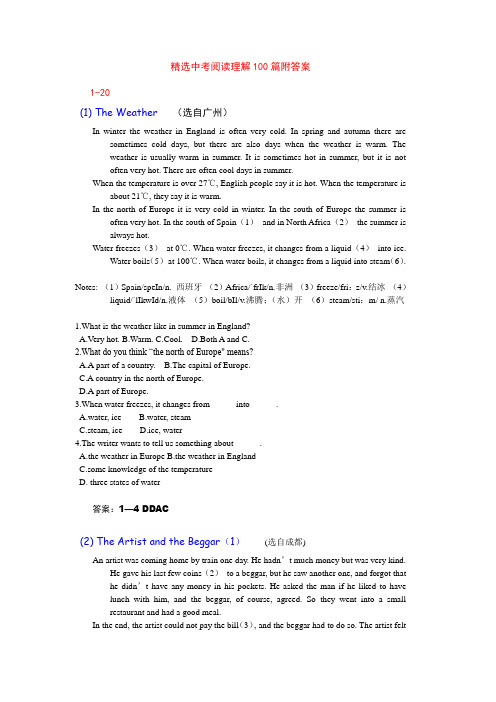
精选中考阅读理解100篇附答案1-20(1) The Weather (选自广州)In winter the weather in England is often very cold. In spring and autumn there are sometimes cold days, but there are also days when the weather is warm. Theweather is usually warm in summer. It is sometimes hot in summer, but it is notoften very hot. There are often cool days in summer.When the temperature is over 27℃, English people say it is hot. When the temperature is about 21℃, they say it is warm.In the north of Europe it is very cold in winter. In the south of Europe the summer is often very hot. In the south of Spain(1)and in North Africa(2)the summer isalways hot.Water freezes(3)at 0℃. When water freezes, it changes from a liquid(4)into ice.Water boils(5)at 100℃. When water boils, it changes from a liquid into steam(6).Notes: (1)Spain/speIn/n. 西班牙(2)Africa/`frIk/n.非洲(3)freeze/fri:z/v.结冰(4)liquid/`lIkwId/n.液体(5)boil/bIl/v.沸腾;(水)开(6)steam/sti:m/ n.蒸汽1.What is the weather like in summer in England?A.Very hot.B.Warm.C.Cool.D.Both A and C.2.What do you think “the north of Europe" means?A.A part of a country.B.The capital of Europe.C.A country in the north of Europe.D.A part of Europe.3.When water freezes, it changes from into.A.water, iceB.water, steamC.steam, iceD.ice, water4.The writer wants to tell us something about.A.the weather in EuropeB.the weather in EnglandC.some knowledge of the temperatureD. three states of water答案:1—4 DDAC(2) The Artist and the Beggar(1)(选自成都)An artist was coming home by train one day. He hadn’t much money but was very kind.He gave his last few coins(2)to a beggar, but he saw another one, and forgot thathe didn’t have any money in his pockets. He asked the man if he liked to havelunch with him, and the beggar, of course, agreed. So they went into a smallrestaurant and had a good meal.In the end, the artist could not pay the bill(3), and the beggar had to do so. The artist feltvery sorry for it, so he said to the beggar, “Come home with me in a taxi, my friend.And I’ll give you the money for our lunch."“Oh, no!" the beggar answered quickly. “I had to pay for your lunch, but I’m not going to pay for your taxi home!"Notes: (1)beggar/`beg/ n.乞丐(2)coin/kIn/n. 硬币(3)bill /bIl/n.帐单1.What kind of man was the artist?2.What did he do to the first beggar?3.What did the artist forget when he invited another beggar to have lunch with him?4.Who paid for the meal?5.What did the artist want to do at last?6.Why didn’t the beggar go home with the artist?答案:1.The artist is a kind man.2.He gave his last few coins to the first beggar.3.He forgot that he had no money then.4.The beggar paid for the bill.5.He wanted to return the beggar the money when he got home.6.Because he wouldn’t pay for the taxi.(3) A Common Language (选自陇南)There is a common(1)language popular in every country in the world. All the people, old and young, men and women, must use it.It’s everybody’s second language. It’s easy to learn, though(2)you don’t hear it.It’s sign language(3).When you wave to a friend, you are using sign language. When you smile at someone, you mean to be friendly. When you put up your hand in class, you are saying,“Please a sk me. I know the correct answer." When you put your finger in front ofyour mouth, you mean “Be quiet." The deaf use sign language to talk to each other.There is even a university for the deaf in the United States. There are also TVprogrammes for the deaf people. They use sign language to tell everybody.Notes: (1)common/`kmn/adj. 共同的(2)though/u/ conj. 尽管(3)sign language 手势语(4)wave/weIv/ v. 挥手1.E uses sign language.2.Sign language is not d, so we can learn it.3.Most people who can s use sign language, too.4.If someone smiles at you, it means he/she is friendly t you.5.If you can a a question, you should put up your hand first.6.You put your finger in front of your mouth if you want someone not to sanything.7.The deaf can talk to each other w sign language.8.Some A deaf people can learn sign language in the university.答案:1.Everyone 2.difficult 3.speak 4.to 5.answer 6.say 7.with 8.American(4) Tom Broke a Plate or a Gold Watch? (选自辽宁)It was Sunday and Tom was staying at home. After breakfast he went out into the garden and played quietly by himself. There were no kids around and he was used to(1)playing alone quietly. He played with Bobby, the dog. He climbed up and down thetree. Sometimes a bird would come down to perch(2)on top of the doghouse. ThenTom would have the greatest fun(3)by throwing a stone or something at it.Though he never made it, he did like doing this kind of thing.Now Tom had been in the garden for half an hour. Suddenly a crack(4)was heard and the little boy began crying.“What’s the matter,Tom?"his mother looked through the kitchen(5)window. Tom ran into the kitchen.“Mum," he sobbed(6). "I broke Bobby’s plate. I didn’t know it was so fragile(7)."His mother put her arms round him and said, “Don’t feel so sad, Tom. We have other plates for Bobby. But how did you break that one?"“I threw it at a bird but missed, and it went straight to the plate."In Tom’s hand was his father’s gold pocket watch(8)!Notes: (1)be used to 习惯于(2)perch/p:t/n. 停歇(3)fun/fn/n. 爱好(4)crack /crk/n. 破碎声(5)kitchen/`kItn/n. 厨房(6)sob/sb/v. 抽泣(7)fragile/`frdaIl/adj. 易碎的(8)gold pocket watch 金怀表1.When did the story happen?A.On a Sunday afternoon.B.On a Sunday morning.C.At noon.D.In the evening.2.When a bird perched on top of the doghouse,Tom.A.would like to play with itB.was very interested in it by throwing a stone at itC.would like to give it something to eatD.would smile3.There were no kids around and he was used to playing alone quietly. Here“kids"means.A.menB.dogsC.childrenD.birds4.How long had Tom been in the garden when his mother heard him cry?A.An hour.B.A day.C.Two hours.D.Half an hour.5.“Though he never made it" means“".A.Though he couldn’t hit a bird with a stone or somethingB.Though he couldn’t catch the birdC.Though he couldn’t have fun from the birdD.Though he couldn’t eat the bird答案:1—5 BBCDA(5) EatingAn important question about eating out is who pays for the meal. If a friend of yours asks you to have lunch with him, you may say something like this,“I’m afraid it’ll haveto be someplace cheap, as I have very little money." The other person may say,“OK,I’ll meet you at McDonald’s."This means that the two agree to go Dutch, that is, each person pays for himself. He may also say,“Oh, no. I want to take you to lunch at Smith’s," or“I want you to try theChinese dumplings there. They’re great." This means the person wants to pay forboth of you. If you feel friendly towards this person, you can go with him and youneedn’t pay for the meal. You may just say,“Thank you. That would be very nice."American customs(1)about who pays for dates(2)are much the same as in other parts of the world. In the old days, American women wanted men to pay for all the meals.But, today, a university(3)girl or a woman in business world will usually pay herway during the day. If a man asks her for a dance outside the working hours, itmeans “Come, as my guest(4).”So as you can see, it is a polite thing to makethe question clear at the very beginning.Notes:(1)custom/`kstm/n. 风俗(2)date/deIt/n.约会(3)university/、ju:nI`v:sItI/n. 大学(4)guest/gest/n. 客人1.The passage tells us.A.how to eat outB.where to eat outC.what to eat outD.who pays for the meal2.If you have little money,.A.you’ll have a cheap mealB.you’ll borrow some from othersC.you’ll ask your friend to pay for your mealD.you won’t want your friends to ask you to dinner3.“Go Dutch" in this passage means.A.去饭馆B.就餐C.订餐D.各自付款4.Sometimes your friend takes you to lunch. It means.A.he’s going to lend some money to youB.he’s going to pay for your meal, tooC.he’ll be angry with youD.he can’t understand you5.In America,some girls and women now.A.ask men to pay for their mealsB.try to pay for the men’s mealsC.try to pay for their own mealsD.never have anything outside答案:1—5 DADBC阅读理解(6)Most children like watching TV.It’s very interesting.By(1)watching TV they can see and learn a lot and know many things about their country and the world.Ofcourse,they can also learn over the radio.But they can learn better and more easilywith TV.Why?Because they can hear and watch at the same time.But they can’t seeanything over the radio.TV helps to open children’s helps to open their minds(2),too.They learn newer and better ways of doing things.They may find the world is now smaller thanbefore.Many children watch TV only on Saturday or Sunday evening.They are always busy with their lessons.But a few children watch TV every night.They go to bed verylate.They can’t have a good rest.How about you,my young friends?Notes:(1)by/baI/prep.通过(2)minds/maIndz/n.智力1.A few children go to bed late because they.A.are busy with their lessonsB.do their homeworkC.watch TVD.listen to the radio2.Children can’t see anything.A.in the radioB.on the radioC.on TVD.by watching TV helps to open children’s.A.eyes and mindsB.mindsC.eyes or mindsD.eyes4.children watch TV only on Saturday or Sunday evening.A.A lotB.MuchC. A lot ofD.A little5.Children can study better and more easily with TV because.A.they like to watch TVB.they can hear at the same timeC.they can watch at the same timeD.they can listen to and see something at the same time参考答案:1.C 2.B 3.A 4.C 5.D阅读理解(7)John was ten years old and he was very lazy[1].He had to go to school,of course,but he was bored[2]there and tried to do as little work as possible.His father and motherwere both doctors and they hoped that he would become one,too,when he grewup.But on e day John said to his mother,“When I finish school, I want to become agarbage collector[3].”“A garbage collector?”his mother asked .She was very surprised.“That’s not a pleasant job.Why do you want to become a garbage collector?”“Because then I’d only have to work one day a week,”John answered.“Only one day a week?”his mother said,“What do you mean?”“Well,”John answered,“I know that the ones who come to our house only work on Wednesday,because I only saw them on that day.”Notes:[1]lazy/leIzI/adj.懒的[2]bored/bd/adj.厌烦[3]garbage collector 垃圾工1.John at school.A.didn’t do any workB.did much workC.did very little workD.tried to finish his work2.John’s parents wanted him to become.A.a garbage collectorB.a doctorC.a teacherD.a worker3.John hoped to be a garbage collector because.A.he knew it was an important and necessary jobB.he thought he would work only one day a weekC.he often saw some garbage collectors come to his houseD.the garbage collectors really work only one day a week4.John thought that the garbage collectors only work one day a week because.A.it was a ruleB.some garbage collectors told him soC.his parents told him soD.he saw them work only on Wednesday参考答案:1.C 2.B 3.B 4.D阅读理解(8)Bill and Fred studied at a university and they were friends. They didn’t have much money, so when it was time for their holidays, Fred said, “Let’s take our holidaysin a trailer[1], Bill. It’s cheaper than a hotel. I can borrow my father’s trailer.”Fred was very happy. So they got into the trailer and began their holidays. They wanted to get up early the next day to go fishing, but they didn’t have an alarm[1] clock.“That’s all right, Bill," Fred said. “I’ll put these pieces of bread on the roof[3] of the trailer tonight and they’ll wake us up in the morning." Bill was very surprised, buthe didn’t say anything.Fred was right. As soon as it began to get light, small birds came down to eat the bread, and their noise on the roof of the trailer woke Bill and Fred up very quickly.Notes:[1]trailer/`treIl/ n. 活动房屋式的拖车[2]alarm/`la:m/ n. 警报alarm clock 闹钟[3]roof/ru:f/ n. 顶;房顶1.Bill and Fred were both university s.2.The two young men decided to go t during their summer holidays.3.The two young men tried to s some money,so they borrowed a trailer.4.The two young men wanted to get up, but they were a to wake up too late thenext morning.5.Fred had a good i.6.Bill didn’t know w his friend put some bread on the top of the trailer.7.The next morning, the birds found the bread and flew to e it.8.In fact, the b woke the two young men up.9.The birds began to look for f as soon as it got light.10.Fred was very c.参考答案:1.students 2.traveling 3.save 4.afraid 5.idea 6.why 7.eat 8.birds 9.food 10.clever阅读理解(9)Some children think writers are great and they can tell people a lot. So they also wish to be writers some day. They mean that they want to write stories or books whichmany persons will read. I would like to remind[1] them that they will need to begood readers and to read a lot in order to[2] be good writers.Nearly all great writers read too long before they started to school, and read for hours and hours every day since they became good readers. Instead of watching TV in theevening, they spend much of their spare[3] time reading books.If you are a good reader, it won’t take you long to do the reading homework your teacher asks you to do. Then you will have time to read other books for fun. Because youread so well, you keep looking for more books to read.While making up your mind[4] to become a good writer, you had better say to yourself,“I must read more and more if I am really to become a good writer."Notes:[1]remind/rI`maInd/v. 提醒[2]in order to 为了[3]spare /spe/adj. 多余的[4]make up one’s mind 下决心1.Some of the children like the g writers.2.The writer told the children to read m before they hope to be writers.3.A lot of writers l a lot from other writers' books and stories.4.For a student, he or she should do the reading homework well f.5.Doing much good reading can h you to be a good writer.参考答案:1.great 2.more 3.learned 4.first 5.help阅读理解(10)Australia is one of the greatest islands in the world.It is a little smaller than China.It is in the south of the earth.So when there is hot summer in our country,it is cold winter inAustralia.Australia is big,but the population[1] has small.The population of Australia is the same as that of Shanghai,a city in China.Australia is famous for its sheep and kangaroos[2].After a short drive from any town,you will find yourself in the middle of white sheep,sheep,sheep,everywhere aresheep.Have you seen a kangaroo?It has a “bag”in its body.The mother kangarookeeps its ba by kangaroo in the “bag”.It is very interesting,isn’t it?Notes:[1]population /、ppjuleIn/n.人口[2]kangaros /、kg`ru:/n.袋鼠根据短文内容判断正(√)、误(×)。
阅读理解100篇及答案阅读理解
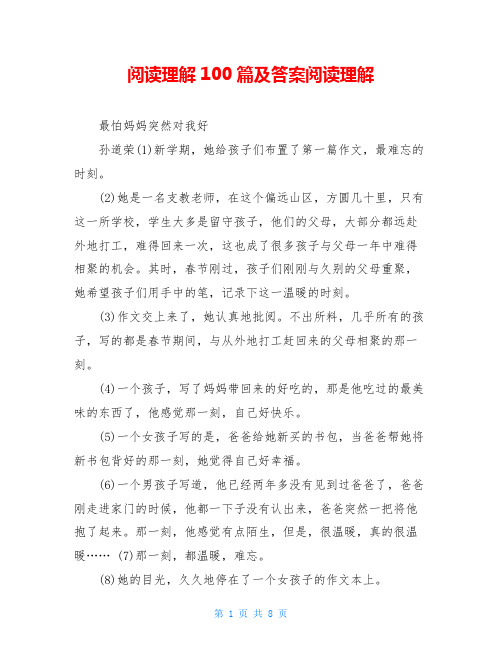
阅读理解100篇及答案阅读理解最怕妈妈突然对我好孙道荣(1)新学期,她给孩子们布置了第一篇作文,最难忘的时刻。
(2)她是一名支教老师,在这个偏远山区,方圆几十里,只有这一所学校,学生大多是留守孩子,他们的父母,大部分都远赴外地打工,难得回来一次,这也成了很多孩子与父母一年中难得相聚的机会。
其时,春节刚过,孩子们刚刚与久别的父母重聚,她希望孩子们用手中的笔,记录下这一温暖的时刻。
(3)作文交上来了,她认真地批阅。
不出所料,几乎所有的孩子,写的都是春节期间,与从外地打工赶回来的父母相聚的那一刻。
(4)一个孩子,写了妈妈带回来的好吃的,那是他吃过的最美味的东西了,他感觉那一刻,自己好快乐。
(5)一个女孩子写的是,爸爸给她新买的书包,当爸爸帮她将新书包背好的那一刻,她觉得自己好幸福。
(6)一个男孩子写道,他已经两年多没有见到过爸爸了,爸爸刚走进家门的时候,他都一下子没有认出来,爸爸突然一把将他抱了起来。
那一刻,他感觉有点陌生,但是,很温暖,真的很温暖…… (7)那一刻,都温暖,难忘。
(8)她的目光,久久地停在了一个女孩子的作文本上。
(9)女孩子写道,以前,是爸爸一个人出去打工,后来,妈妈也出去了,留下我和弟弟,跟着年迈的爷爷一起生活。
每年,他们都只在春节的时候,才能回来,年一过完,他们就又出去打工了。
今年,直到年初二,他们才回到家,因为他们没买到年前的火车票。
(10)这一次,因为没赶回来吃年夜饭,爸爸妈妈答应我和弟弟,会在家里多待几天,这可把我俩乐坏了。
(11)爸爸妈妈回来之后,很忙,除了走亲戚外,他们还要将庄稼地重新翻整一遍,这样,年迈的爷爷春耕的时候,才好播种。
虽然爸爸妈妈回来之后,忙得根本没时间陪伴我们,甚至顾不上我们,但我仍然觉得很满足,很幸福。
(12)一天,妈妈没有下地干活,而是一整天都陪着我和弟弟,给我们做饭,烧了好几个好吃的菜,帮我们把所有的衣服都洗干净叠整齐了,爸爸还检查了我和弟弟的作业……总之,那一天,妈妈和爸爸对我们姐弟俩特别好,特别温柔。
100篇初中生语文阅读题(含答案)
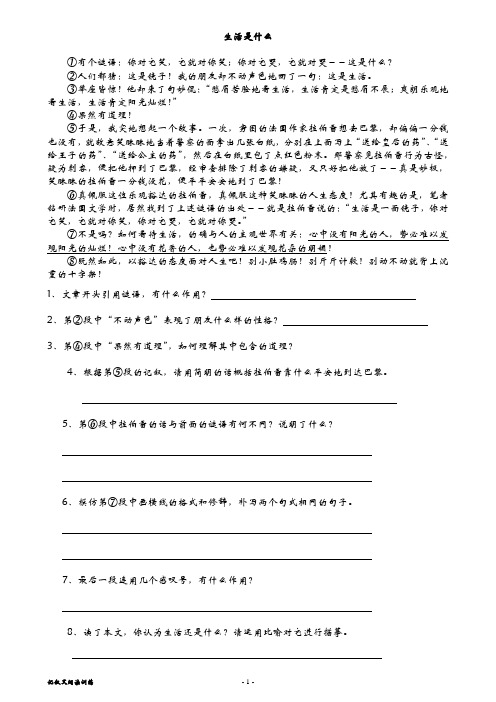
生活是什么①有个谜语:你对它笑,它就对你笑;你对它哭,它就对哭--这是什么?②人们都猜:这是镜子!我的朋友却不动声色地回了一句:这是生活。
③举座皆惊!他却来了句妙侃:“愁眉苦脸地看生活,生活肯定是愁眉不展;爽朗乐观地看生活,生活肯定阳光灿烂!”④果然有道理!⑤于是,我突地想起一个故事。
一次,穷困的法国作家拉伯雷想去巴黎,却偏偏一分钱也没有,就故意笑眯眯地当着警察的面拿出几张白纸,分别在上面写上“送给皇后的药”、“送给王子的药”、“送给公主的药”,然后在白纸里包了点红色粉末。
那警察见拉伯雷行为古怪,疑为刺客,便把他押到了巴黎,经审查排除了刺客的嫌疑,又只好把他放了--真是妙极,笑眯眯的拉伯雷一分钱没花,便平平安安地到了巴黎!⑥真佩服这位乐观豁达的拉伯雷,真佩服这种笑眯眯的人生态度!尤其有趣的是,笔者钻研法国文学时,居然找到了上述谜语的出处--就是拉伯雷说的:“生活是一面镜子,你对它笑,它就对你笑,你对它哭,它就对你哭。
”⑦不是吗?如何看待生活,的确与人的主观世界有关:心中没有阳光的人,势必难以发现阳光的灿烂!心中没有花香的人,也势必难以发现花朵的明媚!⑧既然如此,以豁达的态度面对人生吧!别小肚鸡肠!别斤斤计较!别动不动就背上沉重的十字架!1、文章开头引用谜语,有什么作用?2、第②段中“不动声色”表现了朋友什么样的性格?3、第④段中“果然有道理”,如何理解其中包含的道理?4、根据第⑤段的记叙,请用简明的话概括拉伯雷靠什么平安地到达巴黎。
5、第⑥段中拉伯雷的话与前面的谜语有何不同?说明了什么?6、模仿第⑦段中画横线的格式和修辞,补写两个句式相同的句子。
7、最后一段连用几个感叹号,有什么作用?8、读了本文,你认为生活还是什么?请运用比喻对它进行描摹。
地平线小的时候,我才从秦岭来到渭北大平原,最喜欢骑上自行车在路上无拘无束地奔驰。
庄稼收割了,又没有多少行人,空旷的原野上稀落着一些树丛和矮矮的屋。
差不多一抬头,就看见远远的地方,天和地已经不再平行。
【备战中考】初中语文阅读训练100篇(附参考答案)
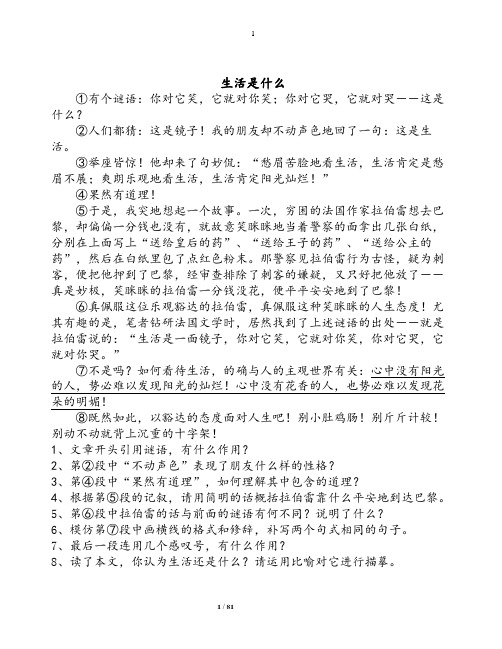
生活是什么①有个谜语:你对它笑,它就对你笑;你对它哭,它就对哭--这是什么?②人们都猜:这是镜子!我的朋友却不动声色地回了一句:这是生活。
③举座皆惊!他却来了句妙侃:“愁眉苦脸地看生活,生活肯定是愁眉不展;爽朗乐观地看生活,生活肯定阳光灿烂!”④果然有道理!⑤于是,我突地想起一个故事。
一次,穷困的法国作家拉伯雷想去巴黎,却偏偏一分钱也没有,就故意笑眯眯地当着警察的面拿出几张白纸,分别在上面写上“送给皇后的药”、“送给王子的药”、“送给公主的药”,然后在白纸里包了点红色粉末。
那警察见拉伯雷行为古怪,疑为刺客,便把他押到了巴黎,经审查排除了刺客的嫌疑,又只好把他放了--真是妙极,笑眯眯的拉伯雷一分钱没花,便平平安安地到了巴黎!⑥真佩服这位乐观豁达的拉伯雷,真佩服这种笑眯眯的人生态度!尤其有趣的是,笔者钻研法国文学时,居然找到了上述谜语的出处--就是拉伯雷说的:“生活是一面镜子,你对它笑,它就对你笑,你对它哭,它就对你哭。
”⑦不是吗?如何看待生活,的确与人的主观世界有关:心中没有阳光的人,势必难以发现阳光的灿烂!心中没有花香的人,也势必难以发现花朵的明媚!⑧既然如此,以豁达的态度面对人生吧!别小肚鸡肠!别斤斤计较!别动不动就背上沉重的十字架!1、文章开头引用谜语,有什么作用?2、第②段中“不动声色”表现了朋友什么样的性格?3、第④段中“果然有道理”,如何理解其中包含的道理?4、根据第⑤段的记叙,请用简明的话概括拉伯雷靠什么平安地到达巴黎。
5、第⑥段中拉伯雷的话与前面的谜语有何不同?说明了什么?6、模仿第⑦段中画横线的格式和修辞,补写两个句式相同的句子。
7、最后一段连用几个感叹号,有什么作用?8、读了本文,你认为生活还是什么?请运用比喻对它进行描摹。
地平线小的时候,我才从秦岭来到渭北大平原,最喜欢骑上自行车在路上无拘无束地奔驰。
庄稼收割了,又没有多少行人,空旷的原野上稀落着一些树丛和矮矮的屋。
差不多一抬头,就看见远远的地方,天和地已经不再平行。
初中现代文阅读小说100篇训练(带答案、解析)

初中现代⽂阅读⼩说100篇训练(带答案、解析)⼀、现代⽂阅读阅读下⾯⽂字,完成⼩题。
林教头刺配沧州道施耐庵①只说董超、薛霸将⾦⼦分受⼊已,送回家中,取了⾏李包裹,拿了⽔⽕棍,便来使⾂房⾥取了林冲,监押上路。
当⽇出得城来,离城三⼗⾥多路歇了。
当下董、薛⼆⼈带林冲到客店⾥,歇了⼀夜。
第⼆⽇天明起来,打⽕吃了饮⾷,授沧州路上来。
时遇六⽉天⽓,炎暑正热。
林冲初吃棒时,倒也⽆事,次后三两间,天道盛热,棒疮却发,⼜是个新吃棒的⼈,路上⼀步挨⼀步,⾛不动。
董超道:“你好不晓事!此去沧州⼆千⾥有余的路,你这样般⾛,⼏时得到。
”林冲道:“⼩⼈在太尉府⾥折了些便宜,前⽇⽅才吃棒,棒疮举发,这般炎热,上下只是担待⼀步。
” 薛霸道:“你⾃慢慢的⾛,你听咭咶。
”董超⼀路上喃喃咄咄的,⼝⾥埋怨叫苦,说道:“却是⽼爷们晦⽓,撞着你这个魔头。
”②看看天⾊⼜晚,三⼈投村中客店⾥看。
到得房内,两个公⼈放了棍棒,解下包裹。
林冲也把包来解了,不等公⼈开⼝,去包⾥取些碎银两,夹店⼩⼆买些酒⾁,籴些⽶来,安排盘馔,请两个防送公⼈坐了吃。
董超、薛霸⼜添酒来,把林冲灌的醉了,和伽倒在⼀边。
薛霸去烧⼀锅百沸滚汤,提将来倾在脚盆内,叫道:“林教头,你也洗了脚好睡。
”林冲挣的起来,被枷碍了,曲⾝不得。
薛霸便道:“我替你洗。
”林冲忙道:“使不得!”薛霸道:“出路⼈那⾥计较的许多。
”林冲不知是计,只顾伸下脚来,被薛霸只⼀按,按在滚汤⾥。
林冲叫⼀声:“哎也!”急缩得起时,泡得脚⾯红肿了。
林冲道:“不消⽣受。
”薛霸道:“只见罪⼈伏侍公⼈,那曾有公⼈伏侍罪⼈。
好意叫他洗脚,颠倒嫌冷嫌热,却不是好⼼不得好报。
”⼝⾥喃喃的骂了半夜,林冲那⾥敢回话,⾃去倒在⼀边。
他两个泼了这⽔,⾃换些⽔去外边洗了脚收拾。
睡到四更,同店⼈都未起,薛霸起来烧了⾯汤,安排打⽕做饭吃。
林冲起来,晕了,吃不得,⼜⾛不动。
薛霸拿了⽔⽕棍,催促动⾝。
董超去腰⾥解下⼀双新草鞋,⽿朵并索⼉却是⿇编的,叫林冲穿。
初三阅读理解100篇

01留两个柿子看树①小时候,父亲在外地,母亲一人担起了家中所有的农活,里里外外忙个不停。
在生活中母亲处处教导我们节俭,摘柿子的时候不论大小都让我和弟弟摘下来。
②挨着院墙有一排柿子树,黑黑的躯干,粗糙的树皮,一如历尽岁月沧桑的长者,安详、淡定。
霜浓秋重的时候,柿树上果实累累,不甘寂寞的柿叶,被秋染红,随风而动,远远望去好像一团火。
那些饱满而丰润的柿子很快就褪去少女般的青涩,追寻着岁月的脚步由金黄圆润转身披上红彤彤的嫁衣,坠在枝头闪动着红色的亮光,特别诱人。
③每到收获的季节,母亲总让我和弟弟爬到树上去,想方设法把柿子摘下来。
甚至连树梢上带着青色斑点的小柿子也不放过。
在母亲的监督下,所有的柿树都会被我们“扫荡”很多遍。
母亲顶着一块蓝色的方巾在树下接着,更不忘叮嘱我们小心点,小心点。
记得有一次,在母亲的指挥下,我爬到高高的树梢上摘柿子,大个的“红灯笼”尽收篮里,剩下的柿子青色还未褪尽,小小的如同棉桃子,我嫌小没有摘。
母亲却不以为然,她说:“摘下来都是钱,放在树上一分钱换不到,多可惜啊。
你的学费就是这些柿子换来的。
”后来,母亲用竹竿做成网套,还是把那些柿子套了下来。
乡下的人家底薄,日子都算计着过,手指缝张大一点都是浪费。
母亲说:“一个柿子可以换来一碗茶,该节省的还是要节省。
”④从那后我记住了母亲的话,每年都把树上的柿子摘得干干净净。
⑤月滚着月,年滚着年。
后来,我们兄妹都离开了家乡,回家的次数越来越少。
上次回家,已是深秋,天高雾浓,落叶像断魂的金蝴蝶摇摆着生命最后的舞姿,遍地枯黄。
一群群南飞的大雁从北方驮着初冬的寒气到来。
光秃秃的柿树,尖尖的顶枝直刺着灰色而悠远的天空,如记忆一样悠远、渺茫。
树枝在风中颤抖着,等待着冬去,树上只剩下孤独的红柿子。
⑥我爬到树上把那些“红灯笼”一个个从树上摘下来,看到树梢上还剩下两个大而红的柿子,我沿着树枝向前挪动脚步,想把它们摘下来。
而那一刻母亲却说,“别摘了,留着吧。
”我说:“留着是浪费,摘下来吧。
精选中考阅读理解100篇附答案

精选中考阅读理解100篇附答案-CAL-FENGHAI-(2020YEAR-YICAI)_JINGBIAN精选中考阅读理解100篇附答案1-20(1) The Weather (选自广州)In winter the weather in England is often very cold. In spring and autumn there are sometimes cold days, but there are also days when the weather is warm. Theweather is usually warm in summer. It is sometimes hot in summer, but it is notoften very hot. There are often cool days in summer.When the temperature is over 27℃, English people say it is hot. When the temperature is about 21℃, they say it is warm.In the north of Europe it is very cold in winter. In the south of Europe the summer is often very hot. In the south of Spain(1)and in North Africa(2)the summer isalways hot.Water freezes(3)at 0℃. When water freezes, it changes from a liquid(4)into ice.Water boils(5) at 100℃. When water boils, it changes from a liquid into steam(6).Notes: (1)Spain/speIn/n. 西班牙(2)Africa/`frIk/n.非洲(3)freeze/fri:z/v.结冰(4)liquid/`lIkwId/n.液体(5)boil/bIl/v.沸腾;(水)开(6)steam/sti:m/n.蒸汽1.What is the weather like in summer in EnglandA.Very hot.B.Warm.C.Cool.D.Both A and C.2.What do you think “the north of Europe" means?A.A part of a country.B.The capital of Europe.C.A country in the north of Europe.D.A part of Europe.3.When water freezes, it changes from into.A.water, iceB.water, steamC.steam, iceD.ice, water4.The writer wants to tell us something about.A.the weather in EuropeB.the weather in EnglandC.some knowledge of the temperatureD. three states of water答案:1—4 DDAC(2) The Artist and the Beggar(1)(选自成都)An artist was coming home by train one day. He hadn’t much money but was very kind.He gave his last few coins(2) to a beggar, but he saw another one, and forgotthat he didn’t have any money in his pockets. He asked the man if he liked tohave lunch with him, and the beggar, of course, agreed. So they went into a smallrestaurant and had a good meal.In the end, the artist could not pay the bill(3), and the beggar had to do so. The artist felt very sorry for it, so he said to the beggar, “Come home with me in a taxi, myfriend. And I’ll give you the money for our lunch."“Oh, no!" the beggar answered quickly. “I had to pay for your lunch, but I’m not going to pay for your taxi home!"Notes: (1)beggar/`beg/ n.乞丐(2)coin/kIn/n. 硬币(3)bill /bIl/n.帐单1.What kind of man was the artist?2.What did he do to the first beggar?3.What did the artist forget when he invited another beggar to have lunch with him?4.Who paid for the meal?5.What did the artist want to do at last?6.Why didn’t the beggar go home with the artist?答案:1.The artist is a kind man.2.He gave his last few coins to the first beggar.3.He forgot that he had no money then.4.The beggar paid for the bill.5.He wanted to return the beggar the money when he got home.6.Because he wouldn’t pay for the taxi.(3) A Common Language (选自陇南)There is a common(1) language popular in every country in the world. All the people, old and young, men and women, must use it.It’s everybody’s second language. It’s easy to learn, though(2) you don’t hear it.It’s sign language(3).When you wave to a friend, you are using sign language. When you smile at someone, you mean to be friendly. When you put up your hand in class, you are saying, “Pleaseask me. I know the correct answer." When you put your finger in front of yourmouth, you mean “Be quiet." The deaf use sign language to talk to each other.There is even a university for the deaf in the United States. There are also TVprogrammes for the deaf people. They use sign language to tell everybody.Notes: (1)common/`kmn/adj. 共同的(2)though/u/ conj. 尽管(3)sign language 手势语(4)wave/weIv/ v. 挥手1.E uses sign language.2.Sign language is not d, so we can learn it.3.Most people who can s use sign language, too.4.If someone smiles at you, it means he/she is friendly t you.5.If you can a a question, you should put up your hand first.6.You put your finger in front of your mouth if you want someone not to sanything.7.The deaf can talk to each other w sign language.8.Some A deaf people can learn sign language in the university.答案:1.Everyone 2.difficult 3.speak 4.to 5.answer 6.say 7.with 8.American(4) Tom Broke a Plate or a Gold Watch? (选自辽宁)It was Sunday and Tom was staying at home. After breakfast he went out into the garden and played quietly by himself. There were no kids around and he was used to(1)playing alone quietly. He played with Bobby, the dog. He climbed up and down thetree. Sometimes a bird would come down to perch(2) on top of the doghouse.Then Tom would have the greatest fun(3) by throwing a stone or something at it.Though he never made it, he did like doing this kind of thing.Now Tom had been in the garden for half an hour. Suddenly a crack(4) was heard and the little boy began crying.“What’s the matter,Tom"his mother looked through the kitchen(5) window. Tom ran into the kitchen.“Mum," he sobbed(6). "I broke Bobby’s plate. I didn’t know it was so fragile (7)."His mother put her arms round him and said, “Don’t feel so sad, Tom. We have other plates for Bobby. But how did you break that one"“I threw it at a bird but missed, and it went straight to the plate."In Tom’s hand was his father’s gold pocket watch(8)!Notes: (1)be used to 习惯于(2)perch/p:t/n. 停歇(3)fun/fn/n. 爱好(4)crack /crk/n. 破碎声(5)kitchen/`kItn/n. 厨房(6)sob/sb/v. 抽泣(7)fragile/`frdaIl/adj. 易碎的(8)gold pocket watch 金怀表1.When did the story happen?A.On a Sunday afternoon.B.On a Sunday morning.C.At noon.D.In the evening.2.When a bird perched on top of the doghouse,Tom.A.would like to play with itB.was very interested in it by throwing a stone at itC.would like to give it something to eatD.would smile3.There were no kids around and he was used to playing alone quietly. Here“kids"means.A.menB.dogsC.childrenD.birds4.How long had Tom been in the garden when his mother heard him cry?A.An hour.B.A day.C.Two hours.D.Half an hour.5.“Though he never made it" means“".A.Though he couldn’t hit a bird with a stone or somethingB.Though he couldn’t catch the birdC.Though he couldn’t have fun from the birdD.Though he couldn’t eat the bird答案:1—5 BBCDA(5) EatingAn important question about eating out is who pays for the meal. If a friend of yours asks you to have lunch with him, you may say something like this,“I’m afraidit’ll have to be someplace cheap, as I have very little money." The other personmay say,“O K, I’ll meet you at McDonald’s."This means that the two agree to go Dutch, that is, each person pays for himself. He may also say,“Oh, no. I want to take you to lunch at Smith’s," or“I want you to trythe Chinese dumplings there. They’re great." This means the person wants to payfor both of you. If you feel friendly towards this person, you can go with him andyou needn’t pay for the meal. You may just say,“Thank you. That would be verynice."American customs(1) about who pays for dates(2) are much the same as in other parts of the world. In the old days, American women wanted men to pay for all themeals. But, today, a university(3) girl or a woman in business world will usuallypay her way during the day. If a man asks her for a dance outside the working hours,it means “Come, as my guest(4).” So as you can see, it is a polite thing tomake the question clear at the very beginning.Notes:(1)custom/`kstm/n. 风俗(2)date/deIt/n.约会(3)university/、ju:nI`v:sItI/n. 大学(4)guest/gest/n. 客人1.The passage tells us.A.how to eat outB.where to eat outC.what to eat outD.who pays for the meal2.If you have little money,.A.you’ll have a cheap mealB.you’ll borrow some from othersC.you’ll ask your friend to pay for your mealD.you won’t want your friends to ask you to dinner3.“Go Dutch" in this passage means.A.去饭馆B.就餐C.订餐D.各自付款4.Sometimes your friend takes you to lunch. It means.A.he’s going to lend some money to youB.he’s going to pay for your meal, to oC.he’ll be angry with youD.he can’t understand you5.In America,some girls and women now.A.ask men to pay for their mealsB.try to pay for the men’s mealsC.try to pay for their own mealsD.never have anything outside答案:1—5 DADBC阅读理解(6)Most children like watching TV.It’s very interesting.By(1) watching TV they can see and learn a lot and know many things about their country and the world.Ofcourse,they can also learn over the radio.But they can learn better and more easilywith TV.Why?Because they can hear and watch at the same time.But they can’t seeanything over the radio.TV helps to open children’s helps to open their minds(2),too.They learn newer and better ways of doing things.They may find the world is now smaller thanbefore.Many children watch TV only on Saturday or Sunday evening.They are always busy with their lessons.But a few children watch TV every night.They go to bed very late.Theycan’t have a good rest.How about you,my young friends?Notes:(1)by/baI/prep.通过(2)minds/maIndz/n.智力1.A few children go to bed late because they.A.are busy with their lessonsB.do their homeworkC.watch TVD.listen to the radio2.Children can’t see anything.A.in the radioB.on the radioC.on TVD.by watching TV helps to open children’s.A.eyes and mindsB.mindsC.eyes or mindsD.eyes4.children watch TV only on Saturday or Sunday evening.A.A lotB.MuchC. A lot ofD.A little5.Children can study better and more easily with TV because.A.they like to watch TVB.they can hear at the same timeC.they can watch at the same timeD.they can listen to and see something at the same time参考答案:1.C 2.B 3.A 4.C 5.D阅读理解(7)John was ten years old and he was very lazy[1].He had to go to school,of course,but he was bored[2]there and tried to do as little work as possible.His father and motherwere both doctors and they hoped that he would become one,too,when he grewup.But one da y John said to his mother,“When I finish school, I want to become agarbage collector[3].”“A garbage collector?”his mother asked .She was very surprised.“That’s not a pleasant job.Why do you want to become a garbage collector?”“Because then I’d only have to work one day a week,”John answered.“Only one day a week?”his mother said,“What do you mean?”“Well,”John answered,“I know that the ones who come to our house only work on Wednesday,because I only saw them on that day.”Notes:[1]lazy/leIzI/adj.懒的 [2]bored/bd/adj.厌烦 [3]garbage collector 垃圾工1.John at school.A.didn’t do any workB.did much workC.did very little workD.tried to finish his work2.John’s parents wanted him to become.A.a garbage collectorB.a doctorC.a teacherD.a worker3.John hoped to be a garbage collector because.A.he knew it was an important and necessary jobB.he thought he would work only one day a weekC.he often saw some garbage collectors come to his houseD.the garbage collectors really work only one day a week4.John thought that the garbage collectors only work one day a week because.A.it was a ruleB.some garbage collectors told him soC.his parents told him soD.he saw them work only on Wednesday参考答案:1.C 2.B 3.B 4.D阅读理解(8)Bill and Fred studied at a university and they were friends. They didn’t have much money, so when it was time for their holidays, Fred said, “Let’s take our holidaysin a trailer[1], Bill. It’s cheaper than a hotel. I can borrow my father’s trailer.”Fred was very happy. So they got into the trailer and began their holidays. They wanted to get up early the next day to go fishing, but they didn’t have an alarm[1] clock.“That’s all right, Bill," Fred said. “I’ll put these pieces of bread on the roof[3] of the trailer tonight and they’ll wake us up in the morning." Bill was very surprised,but he didn’t say anything.Fred was right. As soon as it began to get light, small birds came down to eat the bread, and their noise on the roof of the trailer woke Bill and Fred up very quickly.Notes:[1]trailer/`treIl/ n. 活动房屋式的拖车 [2]alarm/`la:m/ n. 警报 alarm clock 闹钟[3]roof/ru:f/ n. 顶;房顶1.Bill and Fred were both university s.2.The two young men decided to go t during their summer holidays.3.The two young men tried to s some money,so they borrowed a trailer.4.The two young men wanted to get up, but they were a to wake up too late thenext morning.5.Fred had a good i.6.Bill didn’t know w his friend put some bread on the top of the trailer.7.The next morning, the birds found the bread and flew to e it.8.In fact, the b woke the two young men up.9.The birds began to look for f as soon as it got light.10.Fred was very c.参考答案:1.students 2.traveling 3.save 4.afraid 5.idea 6.why 7.eat 8.birds 9.food 10.clever阅读理解(9)Some children think writers are great and they can tell people a lot. So they also wish to be writers some day. They mean that they want to write stories or books whichmany persons will read. I would like to remind[1] them that they will need to begood readers and to read a lot in order to[2] be good writers.Nearly all great writers read too long before they started to school, and read for hours and hours every day since they became good readers. Instead of watching TV in theevening, they spend much of their spare[3] time reading books.If you are a good reader, it won’t take you long to do the reading homework your teacher asks you to do. Then you will have time to read other books for fun.Because you read so well, you keep looking for more books to read.While making up your mind[4] to become a good writer, you had better say to yourself,“I must read more and more if I am really to become a good writer."Notes:[1]remind/rI`maInd/v. 提醒 [2]in order to 为了 [3]spare /spe/adj. 多余的 [4]make up one’s mind 下决心1.Some of the children like the g writers.2.The writer told the children to read m before they hope to be writers.3.A lot of writers l a lot from other writers' books and stories.4.For a student, he or she should do the reading homework well f.5.Doing much good reading can h you to be a good writer.参考答案:1.great 2.more 3.learned 4.first 5.help阅读理解(10)Australia is one of the greatest islands in the world.It is a little smaller than China.It is in the south of the earth.So when there is hot summer in our country,it is cold winterin Australia.Australia is big,but the population[1] has small.The population of Australia is the same as that of Shanghai,a city in China.Australia is famous for its sheep and kangaroos[2].After a short drive from any town,you will find yourself in the middle of white sheep,sheep,sheep,everywhere aresheep.Have you seen a kangaroo?It has a “bag” in its body.The mother kangarookeeps its ba by kangaroo in the “bag”.It is very interesting,isn’t it?Notes:[1]population /、ppjuleIn/n.人口 [2]kangaros /、kg`ru:/n.袋鼠根据短文内容判断正(√)、误(×)。
初三阅读理解100篇答案

01参考答案1.小时候母亲要我们把柿子摘干净,后来回家摘柿子时母亲却要留两个柿子看树。
(意近即可)2.交代小时候的家境和母亲的勤劳节俭,为下文作铺垫,总领全文。
(“交代小时候的家境和母亲的勤劳节俭”,1分;“为下文作铺垫,总领全文”,1分。
意近即可)3.交待时令,写出了深秋的萧索孤寂,表达了母亲因子女长期离开家乡后的孤独寂寞之感。
(“交待时令,写出了深秋的萧索孤寂”,1分;“表达了母亲因子女长期离开家乡后的孤独寂寞之感”,1分。
意近即可)4.多次写母亲要我们把柿子摘干净,一方面强调了家境的拮据和母亲的节俭;另一方面起铺垫作用,与后文母亲要留两个柿子看树形成鲜明对比,突出小说的主题。
(“强调了家境的拮据和母亲的节俭”,1分;“起铺垫作用,与后文母亲要留两个柿子看树形成鲜明对比”,l分;“突出小说的主题”,1分。
意近即可)5.母亲老了,孩子们又经常不在家,孤独寂寞,也需要子女的陪伴。
(答出大致相同的意思即可。
)02参考答案1.“借你一个微笑”,就是作为老师的“我”,想方设法通过多种途径让李俊能够逐步学会微笑,向“我”微笑,以便培养他的自信心,使他的性格由内向忧郁变得乐观开朗,由自卑变得自信,进而培育他健全的心理和人格。
(意思对即可。
)2.老师向我借微笑?微笑也能借吗?是不是老师不喜欢我平时愁眉苦脸的样子,要我笑?是老师不愿意为我这差生补课而找借口?还是……不过,只要老师愿意为我补习物理,那我就笑笑吧。
(心理内容符合情境的给2分;语言通畅给2分。
)3.做了两件事:①课堂上“我”想方设法让李俊开口说话; (答“课堂上‘我’有意让李俊朗读例题和复述题目要求”也算对):②“我”“别有用心”地递题目纸条给李俊,“迫使”他和同学进行讨论。
(答“我特意递题目纸条给李俊,促使他和同学讨论完成”也算对。
) (每答对一点给1分,答“课堂上,我向注视着我的李俊微笑”也给1分。
语言不够简洁的酌情扣分。
)4. 不矛盾①“我为他补的都差不多了”是指“我”为他弥补了性格上的缺陷。
- 1、下载文档前请自行甄别文档内容的完整性,平台不提供额外的编辑、内容补充、找答案等附加服务。
- 2、"仅部分预览"的文档,不可在线预览部分如存在完整性等问题,可反馈申请退款(可完整预览的文档不适用该条件!)。
- 3、如文档侵犯您的权益,请联系客服反馈,我们会尽快为您处理(人工客服工作时间:9:00-18:30)。
阅读理解(25)
阅读下面短文,并根据短文内容选择正确答案: It was Mother's Day,but the young mother was a little unhappy,because she was 800 miles away from her parents.In the morning she phoned her mother to wish her a happy Mother's Day,and her mother told her about the beautiful lilacs(丁香)in the garden. Later that day,when she told her husband about the lilacs,he said,“I know where we can find all that you want.Get the children and come on.”So they went,driving down the country roads. There on a small hill,they saw a lot of beautiful purple lilacs.The young woman ran quickly to enjoy the flowers.Carefully,she picked a few here and a few there.On their way home there was a smile on her face. When they were passing a nursing home(养老院),the young woman saw an old granny sitting in a chair.She had no children with her. They stopped the car and the young woman walked to the old woman,put the flowers in her hands,and smiled at her.The old granny thanked her again and again.She smiled happily,too. When the young mother came back to her car,her children asked her,“Who is that old granny?Why did you give our flowers to her?” “I don't know her,”their mother said.“But it's Mother's Day,and she has
阅读理解(24)
Mr Brown likes to be exact(确切的).One day when he took a walk in the street,a man came up and asked him the way to the bookshop.He said to him,“Cross the bridge(过桥) and turn to the right.”The man asked again,“Is the bridge very long?”“Only thirty metres long.” The man thanked him and
went to the bridge.Suddenly he heard a man running after him.“Stop!”Mr Brown said to the man.“I'm sorry.I forget the bridge is forty metres long.If you walk thirty metres long and turn to the right,you will fall into the river.” 根据短文内容,判断下列句子的正(T)误(F)。 1.Mr Brown likes going to the bookshop. 2.The bookshop is on the other side of the river. 3.The bridge is forty metres long. 4.Mr Brown ran after the man to tell him how long the bridge is exactly. 5.The man would fall into the river if Mr Brown didn't tell him how long the bridge was. 参考答案:1—5 FTTTF
精选中考阅读理解100篇(附答案) 21-35 阅读理解(21)
Once there was a black and white cat.He was named Tom.One day he was asleep under a tree in the forest.Suddenly he was awakened by the song of a bird.Then he felt very hungry.He wanted to have something good to eat. He looked around.He looked up at the blue sky and looked down at the green grass.Something was moving in the tree.It was a sparrow(麻雀). He talked to the sparrow and asked it to be friends with him.When it came near,he caught the sparrow.He was going to eat it.The sparrow said,“No gentleman eats his dinner till he has washed his face.” The cat was surprised to hear that.He began to wash his face with his paw,and the sparrow flew away. The cat was sorry to lose his dinner and said,“As long as I live,I will eatБайду номын сангаасfirst and wash my face afterward.” 根据短文内容,完成下列问题。 1.How did the cat feel to lose his dinner? 2.What was the cat's name? 3.What did the sparrow ask the cat to wash? 4.What will the cat do first in the future? 5.Where was the cat? 参考答案:1.He felt sorry.2.Tom.3.His face.4.Eating.5.In the forest.
shirt like the one his father wears.It is an important moment in his life and means that he must now be a manly little boy like his father.He must smile when he has pain(疼痛)or trouble.He must carry on. The day a girl becomes seven years old is a big day in the family.She may now wear a sash(腰带)like the one her mother wears.Her friends and her mother's friends come and drink tea and eat cakes. It means that the girl must now be a womanly little girl and help in the home. One of the great holidays in Japan is the Emperor's(天皇)birthday. Instead of school there are picnics,games,sports and speeches(演讲), as we have on our fourth of July in America. 根据短文内容选择正确答案。 1.How many holidays and great days are told of in the story? . A.One B.Two C.Three D.Four 2.When a boy begins to wear a shirt like the one his father wears, . A.he isn't a boy B.he needn't go to school C.he must be a boy of strong character(性格)like his father D.he has no trouble 3.Which birthday of a girl is a big day in her family? . A.The sixth B.The seventh C.The eighth D.The seventeenth 4.Japanese children don't go to school on . A.their fifth birthdays B.their seventh birthdays C.their fifth and seventh birthdays D.their Emperor's birthday 5.From the story we can know the writer is from . A.China B.America C.England D.Japan 参考答案:1—5 CCBDB
